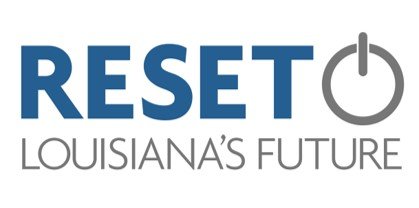Three of Louisiana’s most respected nonpartisan organizations are working together this election season on a program they call RESET. It is important for candidates and voters to understand that nonpartisan means these organizations are unbiased, impartial, neutral and objective.
The Committee of 100 for Economic Development (C100), the Council for a Better Louisiana (CABL) and the Public Affairs Research Council of Louisiana (PAR) and their thousands of members call RESET “a renewed vision and a strong effort to make Louisiana everything it can be.”
Mike Olivier, president and CEO of C100, told the Greater Baton Rouge Business Report, “This is the largest (legislative) turnover as a result of term limits that we’ve had in years. So we have the largest number of people out there who can influence and make a change fairly quickly.”
The four areas the organizations believe need special attention are state finances, education, transportation infrastructure and criminal justice/public safety. None are new issues, and legislators have made progress on some. However, much more needs to be done.
Barry Erwin, president of CABL, said of the candidates for governor, “If you listen to what they’re talking about, they’re not really talking about things that move the state forward.”
Democratic Gov. John Bel Edwards is talking about his record, which is a good one, but not what most of RESET is about. U.S. Rep. Ralph Abraham, R-Alto, and Republican businessman Eddie Rispone, Edwards’ two GOP opponents, are focused on which one is more like President Trump.
Erwin said, “Part of this whole effort has to be about changing the conversation.”
The three organizations have interviewed about 90 candidates and are starting to work on the 90 or more incumbents.
Erwin added, “The good news is there are people out there who are serious about running and who are hungry for information. We hope to give them information that is useful before they get to the Legislature and discover that things are not what they thought.”
As the elections get closer, they plan to hone in on candidates that support their positions and do what they can to help them get elected. RESET won’t fund campaigns or demand that anyone sign a pledge.
OK, what needs to be done in the area of finance?
Robert Travis Scott, president of PAR, said Louisiana’s tax structure relies on high rates and not enough tax base, which hurts economic development. RESET is seeking lower rates, an expanded tax base and fewer exemptions and deductions, all of which will make the state more competitive and fair.
In fiscal year 2016-17, potential tax collections totaled $15.7 billion, according to the state Department of Revenue. However, $6.9 billion in estimated exemptions reduced actual collections to nearly $8.8 billion. Individual and corporate federal income tax deductions cost the state $1 billion. Sales tax exemptions totaled $2.4 billion.
Legislators have reduced some exemptions, but they continue to try and give more tax breaks. They promised to reform the state’s budget and tax systems in 2017, but refused to even try
Local governments have resisted creation of a uniform sales tax collection system, and that would be a tremendous incentive for businesses that have to deal with too many taxing jurisdictions.
Adequate funding of early childhood education (birth to age 4) is a main focus of RESET. Legislators appropriated about $20 million at this year’s fiscal session, but $86 million is needed annually. Research shows that children who benefit are less likely to be held back in school, drop out, require special educational services, develop chronic health problems or enter the criminal justice system.
Motorists who travel the state’s roads and bridges know that Louisiana’s transportation system is ranked among the worst in the country. There is a $14 billion road and bridge maintenance and construction backlog and the need for high priority megaprojects totals another $15 billion. Two of those megaprojects are new Interstate 10 bridges over the Calcasieu River at Lake Charles and the Mississippi River at Baton Rouge.
Louisiana, Texas and Oklahoma each have 20-cent-per-gallon state gasoline taxes. Only Arizona, New Mexico, Mississippi, Missouri and Alaska have lower state gasoline taxes. Raising the gasoline tax has been a non-starter in this state for a long time, but it’s obvious a revenue solution of some kind is long overdue.
The state has made progress in reforming its criminal justice system, and RESET wants to see the reforms continue. The savings from legislation already enacted are proving to be better than expected.
State finances and infrastructure will be the biggest challenges. Legislators have made some headway in the other two areas. Financial reform is going to take courage lawmakers haven’t demonstrated in the past. Infrastructure needs money, but transportation taxes are still a tough sell.
RESET couldn’t come at a better time. We wish this major undertaking well.
•
Jim Beam, the retired editor of the American Press, has covered people and politics for more than five decades. Contact him at 337-515-8871 or jbeam@americanpress.com.
